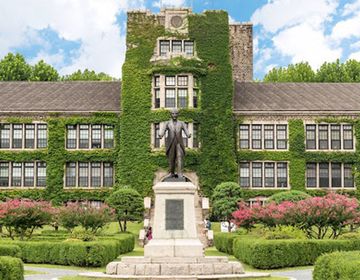Academics in Korea
Thursday, November 14, was a significant day for Seoul, nay, the entirety of Korea. Planes were grounded, the stock market opened late, subway lines increased, and parents bowed their heads in prayer at Buddihist temples. Everyone was holding their breath for hundreds of thousands of high school students taking the high stakes, national university entrance exam.
South Korea has been declared the best educated country in the world, yet it’s days like this that make me especially grateful I attend college in America. Honestly, I don’t think I could handle the immense pressure to achieve academically from my family, peers, teachers, and the entire society built around me. Year round 학원 (hagwons), or after school cram schools, help students advance grade levels and prepare for the college entrance exam. It’s not uncommon for parents to take on extra jobs to afford these expensive, but prevailing private schools that often start at elementary school level. This shadow education offers classes until 10 pm at night, where Korean youth accumulate 70 to 80 hours of studying each week. So yeah, it’s these students I was about to share four months of classroom time with at Yonsei, one of the most widely regarded universities in Korea.
I first realized how different the atmosphere of Korea was during CIEE study abroad orientation, when staff had study abroad students and Korean university students rank our most important values. On the top of the foreigners list was: happiness, respect, honesty, equality, and relationships. The priorities of the Korean student lead with education, followed by speed, wealth, competition, security, relationships, and reputation. Well, at least we both shared relationships!
Thankfully, keeping up with classes here has not been as big an issue as I thought it might have been. The reason probably being I’m taking introductory courses, many with other foreigners, but I’ll take this as a win and run with it.
My hardest class is space astronomy, a physics class where we breakdown space missions and eventually design our own. My teacher instructs in English, but answers questions and explains the material deeper in Korean. Fortunately, when I’m confused about something I can ask my peers in the class who have high English proficiency. (Thank you English class cram schools?) I am the only foreigner in this course, and struggled to make friends in the beginning because of it. But one thing I’ve learned about Korean academics is that they love their group presentations. (Literally, it feels like every big project or midterm is based around a team assignment.) So when we were assigned our first group project, I was approached by three kind girls who saw my lost look and welcomed me. (Fem science power!) I would soon learn just how strong dedication and work ethic is in school. The first thing we did was create multiple group messages to communicate. I’m in the middle of the four week project now, and every day my phone blows up with updates, questions, and new ideas to address. It’s an important part of Korean culture to respond to every message, so I had to leave my typical quiet participation behind. One day I was up late at 3am finishing my part of the study and sent an update to that chat. To my surprise, everyone else was still awake and also had been working for hours to prepare. In our 9am class the next day we bonded over our sleep deprivation and basked in our secure knowledge of the assignment.
Studying abroad in Korea has also opened my eyes to how different cultures behave in academic settings. Professors, or 선생님 (songsaenim), are treated with the utmost respect. Students say thank you after classes end and never ask questions that challenge their authority. This is a stark difference to my US college experience, where we often playfully banter with our professors and aren’t afraid to call them out if a mistake is made. Back home, almost every course has a discussion section, but in Korea, class is heavily lecture based. I’ve noticed in my communication class (wait for the irony), no one ever raises their hand to contribute accept foreigners. Here, students carry a high expectation to prioritize homework over social life. When in another group project, my teammates requested we did a video call at 10pm on a Saturday to work. I cancelled my plans at the club and brought out the books instead to give into the Korean work ethic. One familiarity that stands the test of time is there will always be a few students sleeping or scrolling on their phone throughout class. Good to know even the best schooling in the world has students relaxing the reigns in the little ways they can.
Related Posts
K-Pop Stan’s Guide to South Korea: 5 Must-Do Activities While Studying Abroad
By: Jacqueline Lee South Korea is the place to be as a kpop stan, so here are 5 activity ideas that you must do during your time abroad! 1. Collect... keep reading
Courses at Yonsei University—Difficulty, Planning & Advice!
If you're curious about the difficulty of college courses in South Korea, as well as course planning and advice, then this article is for you. In this blog, I delve into my courses at Yonsei University and offer helpful advice for course planning—tune in to learn more!
Capturing Seoul: My Study Abroad Adventure in South Korea
By: Jack Beattie My name is Jack, I attend Penn State and I am currently studying abroad in Seoul, South Korea. I am studying at one of the top universities... keep reading






